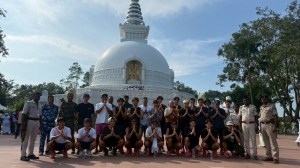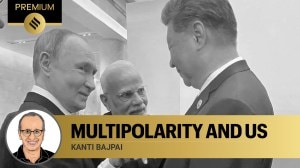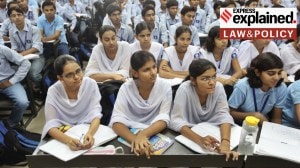As a new country is born in Africa,India extends hand of friendship
Ansari visits Juba,India seeks partnership with oil-rich South Sudan.
Fifty-six years after Pandit Nehru wrote Sudan on his handkerchief to reserve a place for a representative of the then still-not-independent Sudan at the 1955 Bandung Conference of Afro-Asian nations,India hopes to partner an offshoot of that country as it comes into existence tonight.
At midnight 1.30 am India time on Saturday the worlds youngest nation,the Republic of South Sudan,will be born,the result of the split of the largest country in Africa into northern and southern halves.
A new country is coming into existence… It is appropriate for India to participate in celebrations, Vice-President Hamid Ansari told reporters on board the special aircraft flying to Juba,the capital of the new country,to represent India on the historic occasion.
So far,the only high point of Indias relationship with what will be the new Republic of South Sudan has been a day spent by President Fakhruddin Ali Ahmed in Juba to address the Regional Peoples Assembly in December 1975.
When north Sudan suppressed a mutiny by the Equatoria Corps of the southerners in August 1955,India did not take sides. During the 1983-2005 civil war that nearly destroyed south Sudan,India only retained informal contacts with the southern rebels spearheaded by the Sudan Peoples Liberation Movement even when Khartoum (Sudan) turned to China for help against the rebels.
However,sensing the inevitability of the creation of South Sudan,New Delhi has enhanced its contacts with Juba in recent years. Indias Minister of State for External Affairs attended the signing of the Comprehensive Peace Agreement in Nairobi on January 9,2005 the deal that paved the way for the January 2011 referendum in which over 98 per cent of south Sudanese supported breaking away from Khartoum.
Today,as Sudan became the first country to recognise the Republic of South Sudan,dancers decked in South Sudan flags and leopard-print trousers marched through the streets of Juba,counting down the hours until the birth of their new nation.
Impoverished,underdeveloped South Sudan,a huge,fractured territory that straddles Arab and sub-Saharan Africa,contains around 75 per cent of unified Sudans known oil reserves,and some of the biggest oilfields in Africa outside of Nigeria and Angola. As Indias energy needs grow,South Sudan is likely to emerge as one of the crucial sources of oil.
Obviously,the hydrocarbons sector is a priority as we look for energy sources across the world, Hamid Ansari said in reply to a question on Indias priority sectors of engagement with South Sudan. ONGCs foreign investment arm holds a 25 per cent stake in the Greater Nile Petroleum Operating Company (GNOPC),which has its largest investment in Sudan.
By way of deepening its engagement with South Sudan,India announced a $ 10-million grant during a donors conference in 2005,and offered a $100-million concessional loan for projects in both the north and the south. In October 2007,it opened a consulate office in Juba.
From 2006-07,India has offered a number of scholarships to South Sudanese. About 100 officials from the government of South Sudan have availed of these scholarships over the last two years. Indias Foreign Service Institute trained 15 officials from the South Sudan government in 2008. India also hosted a parliamentary delegation from South Sudan in October 2006. In 2008,India hosted the commerce minister of South Sudan as part of the India-Africa partnership project.
In April 2011,Priscilia Joseph Kuch,a minister in the office of the President of South Sudan,paid the first official visit to India on behalf of the South Sudan government. India reciprocated by sending E Ahamed,Minister of State for External Affairs,to South Sudan in June to discuss a roadmap for cooperation in the areas of agriculture,health and petroleum.
As the new government settles down and starts work,we will identify specific areas and projects for cooperation, Ansari said,underlining Indias willingness to partner in capacity-building in South Sudan in the days to come.
On his way to Juba,the Vice-President stopped at Kampala for a bilateral meeting with Ugandan President Yoweri Kaguta Museveni.
(With agency inputs)
Photos





- 01
- 02
- 03
- 04
- 05

























